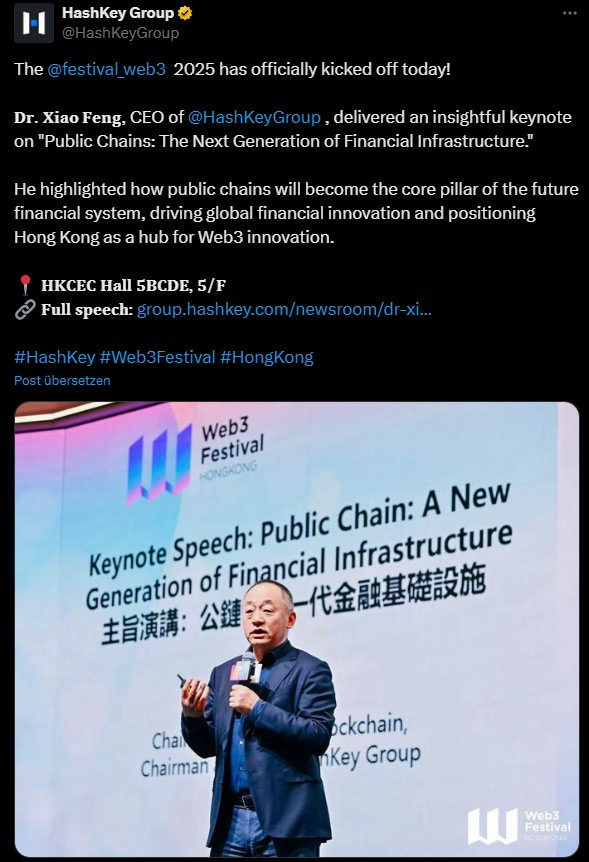Blockchain Set to Power the Next Industrial Revolution, Says HashKey CEO
Opening the 2025 Hong Kong Web3 Festival, HashKey Group Chairman and CEO Dr. Xiao Feng delivered a compelling vision of blockchain technology as the cornerstone of future financial systems. Speaking to a diverse audience of industry leaders, policymakers, and innovators, Xiao articulated how blockchain constitutes a groundbreaking financial architecture, revolutionizing the way transactions are executed, recorded, and regulated.
Financial Innovation: A Historical Precursor to Technological Revolutions
Xiao underscored a recurring historical pattern: every significant industrial revolution is invariably preceded and driven by profound financial innovation. He cited how credit systems underpinned Britain’s original industrial surge, stock exchanges catalyzed America's electrical transformation, and venture capital laid the groundwork for Silicon Valley’s technological dominance. According to Xiao, blockchain-based cryptocurrency finance now stands ready to serve as the critical financial innovation powering the Fourth Industrial Revolution.
Shifting from Traditional Banking to Digital Wallets
One key transition highlighted by Xiao is the gradual migration from conventional banking systems, reliant on traditional accounts and batch settlements, toward blockchain-driven digital wallets offering instantaneous transaction settlements. This shift dramatically enhances operational efficiency, reduces costs, and increases transparency across financial ecosystems.
Regulatory Landscape and Continuous Markets
Xiao also discussed significant regulatory shifts, notably the U.S. Securities and Exchange Commission’s recent stance on stablecoins. By deciding not to classify dollar-backed stablecoins as securities, the SEC has potentially opened doors for greater institutional involvement in blockchain-driven financial processes.
Moreover, Xiao pointed out an interesting market evolution: traditional stock exchanges are now moving towards nearly continuous trading cycles (23-hour days), largely influenced by the round-the-clock operations that cryptocurrency exchanges have demonstrated since inception. He suggested that traditional markets must further adapt to compete effectively in a landscape defined by non-stop blockchain-based trading.
Hong Kong as a Regulatory Sandbox for Blockchain Innovation
The Hong Kong Web3 Festival featured key policymakers including Paul Chan Mo-po, Hong Kong’s Financial Secretary, and senior figures from the Securities and Futures Commission and the Hong Kong Monetary Authority. Xiao emphasized Hong Kong’s unique position as a regulatory laboratory, facilitating blockchain experimentation within a controlled yet innovation-friendly environment. While mainland China maintains restrictive policies on cryptocurrency, Hong Kong serves as an influential proving ground, potentially informing wider policy adoption across China and beyond.
Global Community Meets at Hong Kong Web3 Festival
The Web3 Festival continues through Wednesday, offering an expansive program of expert panels, technology demonstrations, and strategic networking events. Participants include blockchain developers, institutional investors, fintech executives, and regulators, all contributing to the dynamic exchange of ideas shaping the next generation of financial technology.
How to Stay Safe in a World of Crypto Scams: Insights from Blockchain Investigators
Cryptocurrency scams are surging at an alarming rate, leaving countless victims in their wake. According to recent FBI figures, crypto-related investment fraud alone resulted in losses of approximately $3.96 billion in 2023, a staggering 335% rise over two years. Analytics firm




